Although the title, Ex-Husbands (1923), reminds us of the classic 1970 John Cassavetes film and the image that heads this interview seems to be taken from a scene that starred Ben Gazzara, Peter Falk, and the director himself, the film directed by Noah Pritzker bears the stamp of our times and has little to do with the tribulations of those days. Griffin Dunne stars alongside James Norton, Miles Heizer, Richard Benjamin, and Rosanna Arquette in a tragicomedy with weddings, divorces, and a funeral, which explores existential questions from a very contemporary, mature perspective. In Ex-Husbands, Peter Pearce travels to Tulum where his eldest son, Nick, is celebrating his bachelor party. Although he is not welcome, he joins the group, and at the same time, he has pending divorce papers to sign in his room. His father divorced in middle age and lives now in a nursing home, where he goes to visit him, even though he has lost his memory. Ex-husbands deals with attachment, new beginnings, and learning, with a subtle sense of humor.
In this interview, the director and star talk about making the film, the level of personal involvement it entailed, and their collaboration. And more, we discovered Griffin Dunne’s latest project, which is not exactly a film.
EVA PEYDRÓ: My first question is for Mr. Pritzker. It has been seven years since your previous feature, does it mean that you spent all the time working on the same project and the script?
NOAH PRITZKER: I spent a lot of time working on this project and script, but there were a handful of others that came and went and maybe came back some other time. But I would say, before COVID, it looked like we were going to go and make this movie, and then COVID happened, and my attention kind of shifted to some other things. When it felt like maybe people would start to make movies again I went back to the script and throughout COVID Griffin and I had stayed in touch and became friends and I felt like if I really pushed that I could get this movie made with Griffin. And, so that was sort of the light at the end of the tunnel of quarantine, and, and here we are.
E.P.: There’s something biographical in your film?
N.P.: Yes, there’s a lot of biographical in the film. I think, you know, the primary inspiration for the movie were several things in my own life: my parents getting divorced and my own, thinking about getting married, being on the periphery of my brother’s wedding, seeing friends get married and divorced, and all of the stuff that happens in life. And, out of that, I’m not quite sure how, but emerged this character of Peter Pierce. I’m not in my 60s and haven’t been divorced, but for some reason, that character became this container for all that I was thinking about and all of the questions I had been kicking around. And, meeting Griffin and Griffin’s willingness to take on this part brought an entirely new dimension to the project that never could have existed solely on the page.
E.P.: And that means that there were any modifications after rehearsals? Did the actors bring something new to the table?
N.P.: Yeah, a lot. Well, Griffin had been involved in this project for a long time. I had first shown him the scripts before COVID. It’s hard for me to remember now how much the script changed between when he first read it and when we showed up on set. But I think over those years I would sit down with the script and rewrite it with Griffin’s voice and face in my mind. Um, and kind of tailored it to him, and we would talk about the script, and it felt like more fluid than any sort of notes per se, more like just talking about life and the feelings and what we liked about the script or what we felt like could be more appealing to other characters and then I would sit back down and take another pass at it. And so it felt like it evolved around Griffin pretty organically in that way.
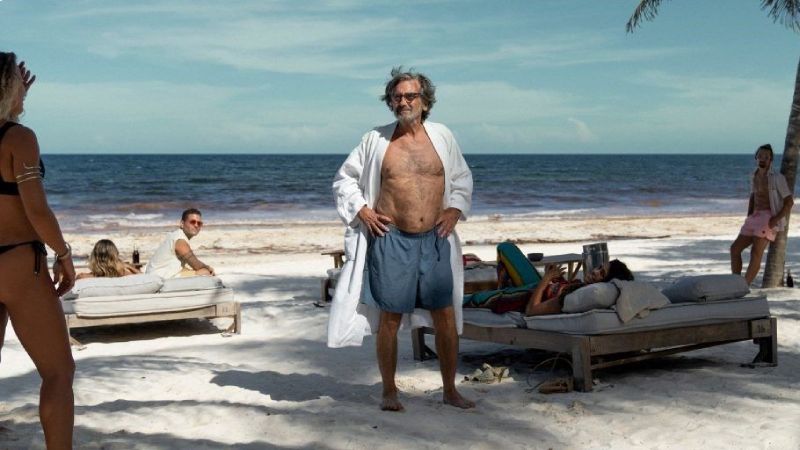
E.P.: Mr. Dunne, when you read the script, did something on it resonate with your experience?
GRIFFIN DUNNE: Yes, certainly. Peter, the character I play, and I have many of the same life experiences. I have been divorced, and I’ve been married. I have a father who passed away, who was divorced from my mother. And I have a daughter who’s the same age as Miles, who is my younger son. I don’t know… but life in limbo, an aspect of this character, appealed to me. I’ve never gone to the extremes of this character, but I love playing characters that are in emotional flux at turning points in their life, and deal with it with humor and neurosis and they can get a little nuts and, it just had all those, those flavors.
E.P.: And the death of the father is an episode that marks our lives. My grandfather said that when his father died and that link in the chain was lost, he felt at once in the front row. So to be in the front row is an expression my family uses often to mean having a different perspective.
G.D.: Yeah, well, that’s a wonderful phrase. You know, there’s a book I’d read coincidentally that I realized I thought about a lot during this movie. Philip Roth wrote a book called Patrimony about the loss of his father and talked about that very aspect. And while he didn’t say front row, a lot of what Philip Roth (one of my favorite writers) was confronting was having to sit in the front row and what all that meant. So, I thought of that very thing, when I was making the movie.
I saw that I was perfect for that kind of a character that I’ve been, you know, on one level or another, a Chekhovian character without ever knowing it, that being tragic and funny, ridiculous, but very, very human, feeling a great deal, and just being able to turn my emotions to have them go from one thing to another and, and react differently and in unlikely ways.
Griffin Dunne
E.P.: Which part of your role was more complicated to perform, that of a father or a son?
G.D.: Um, they were both about the same. I never really felt anything was particularly difficult. Everything felt very, very organic. I love playing the son because my father was Richard Benjamin who was a huge influence on me as a young actor in the 70s as I was entering. He was playing the kind of characters that funnily I ended up playing, in some way, which are sort of, I guess a little nebbishy neurotic kind of person, you know, he perfected that persona and also directed, became a director, which I did as well. And I’d never met him. So, it was an honor, and a treat to work with him. And we talked between takes all the time about movies, movies, movies.
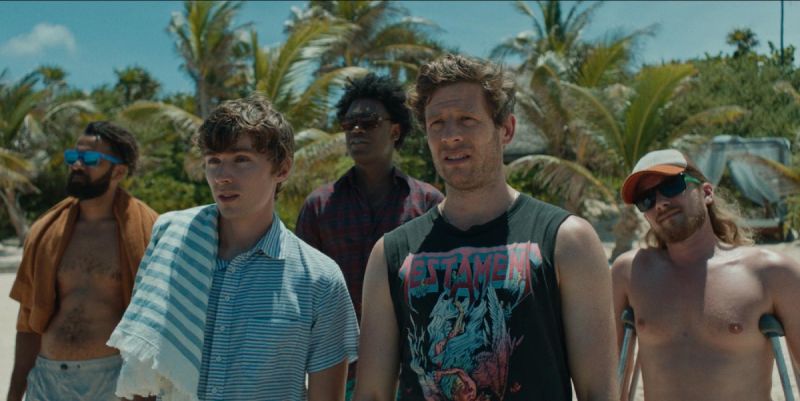
E.P.: And did you improvise?
G.D.: I didn’t really, I don’t think I did. Do you remember me saying anything you didn’t write and then hitting me afterward? (addressing the director).
N.P.: No, I mean, I think there were moments where, you know, we would be doing a scene and Griffin would say, I feel like I need to have a response here, I can’t let this guy have the last word. So there were moments here and there where we would, but there weren’t like scenes, it wasn’t a very improvisational movie, but we had rehearsals, we did have a couple of days or a week of rehearsal where we would read the script and make some tweaks and, you know, all the actors had input, but I wouldn’t say there was a ton of improvising going on.
E.P.: Mr. Pritzker, the film drops us right into the middle of the family situation with the only prologue being the parents’ divorce and the encounter between Nick and Heather, and there’s a huge ellipsis about the couple’s past and the relationship with their children. That makes the film a kind of family iceberg on which you show only a small but very significant part. How do you give us so much information without giving us details? Because we think we know everything, but, without telling you almost anything.
N.P.: I think so much of that is because of having such good actors, you believe they have lived these lives, of these characters. And so, when you meet someone out in the world before knowing much about their biography or anything, you get a sense of who they are and what they’ve been through. And, you know, you kind of piece some things together as you go, and I knew we needed to see Nick at maybe a slightly happier time in his life when he first met Heather. And I felt like we needed to see Peter learning that his parents were getting divorced, so those felt like two keys to understanding the movie that came after it. But I felt like I could get away with just that. Then we could get into the story at hand.
E.P.: Mr. Dunne, your performance is the backbone of the film, how do you get that permanent feeling of discomfort, tension, and melancholy, but at the same time showing so much love? It’s super realistic.
G.D.: Oh, thank you. Well, those, all those adjectives, the discomfort and all that, that’s my bread and butter as an actor of, you know, being in uncomfortable situations and, most times trying to find humor in it. But, as I got older, I took this class, an acting class. I didn’t take an acting class in 30, or 40 years. Still, it was a Chekhov workshop, and all the actors, we just did scenes from Chekhov and I’m well into my 60s and played these Uncle Vanya. I played Ivanov, and I saw that I was perfect for that kind of a character that I’ve been, you know, on one level or another, a Chekhovian character without ever knowing it, that being tragic and funny, ridiculous, but very, very human, feeling a great deal, and just being able to turn my emotions to have them go from one thing to another and, and react differently and in unlikely ways. So, I don’t know. I think those qualities and being able to show love and compassion through it all is, I guess, something that, I had to live long enough, to be able to pull off.
E.P.: That’s amazing. You have developed your work in producing, directing, and acting. You directed one of my favorite documentaries, The Center Will Not Hold. What do you prefer about each side of filmmaking?
G.D.: Well, if I am the star and it’s a really good movie with a really good director, which does not come along very often, I just love acting. But if I’m in that movie you talked about Joan, about my aunt, I think my proudest accomplishment is that I was able to make that movie in her lifetime, have her see, which many writers don’t get to see their audience, which she was able to see when we showed it at the New York Film Festival, the standing ovation that went on longer than they’ve ever had… So I like them both, but I’d love to direct a great script, and I’m developing things as a producer and hopefully to direct, but also since you speak English (I haven’t done this at all for the junket)… I wrote a book too… It’s coming out in America in five days. So I’m in the middle of also promoting that, it’s about my family and I might develop some aspect of that into a series.
E.P.: Congratulations! I am sure it will contain valuable information. And, one question for Mr. Pritzker about the casting process. Did you have Griffin, Richard Benjamin, and Rosanna in mind since the start?
N.: P.: When I first had the idea…, actually it’s funny, it ties back to the Joan documentary…, my wife had gone to see a screening of the Joan Didion documentary and I had been writing the script and trying to figure out who would be right for the role of Peter and she came home from the screening where Griffin had presented the movie and said I just saw Griffin Dunn introduce his documentary and I think he would be perfect for the role, for your movie, and I mentioned it to my producer, Bruce, who’s known Griffin for a long time. And in a kind of unusually easy way, the three of us were able to get lunch after Griffin had read the script and talked about it. It felt like that immediately kind of removed a lot of the stuff that usually comes with a casting process, that there was a direct line of communication. And then it was a long time before it felt like we were going to make this thing, and so as I said earlier, I got to rewrite the script around Griffin. Once it was clear we were going to make the movie, things started to fall into place. I think Griffin and I were both sort of touched and blown away that Richard Benjamin was up for coming to play this small part.
The same thing was on Arquette, and then I think when James Norton signed on to play Nick, it just felt like everything started falling into place in a way that I think can only happen once the train has left the station, which is what makes making a movie so terrifying is I think you want everything to be just right before it leaves the station. And that’s not how, at least in my case, that’s not how it’s worked.
E.P.: I must ask Mr. Dunne about the relationship with Rosanna Arquette. You have been partners in many films.
G.D.: Well, the very first thing we worked on was in 1980, and we were in Poland when it was a Soviet satellite country. The conditions of that movie were really, really tough. And there was an embargo against food being sent… we really bonded strongly during that movie. And, and it worked. I’ve produced movies where she’s been in and we’ve acted together over the years. And it’s really a very rare treat to, you know, be in your sixties. And after knowing someone when he’s from 1980, and you’re a couple yet again, it’s like, I guess it’s like being in a long marriage as if we’d had lots of children and we have a long past and a long history, and we fell into that. We fell into our history and our past very easily. It was not hard to imagine that we’d been married for many, many years.

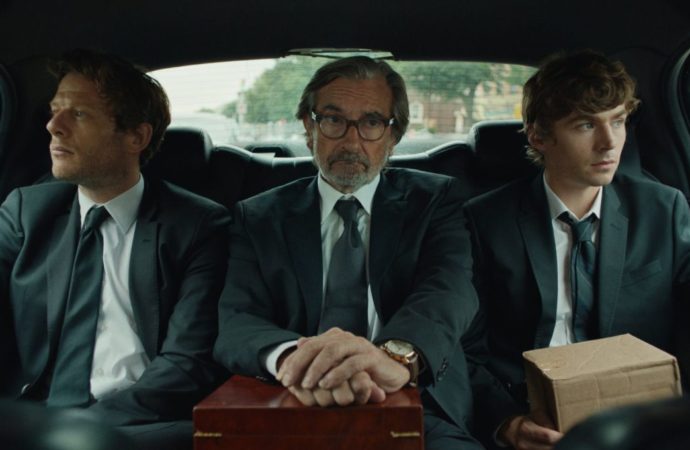


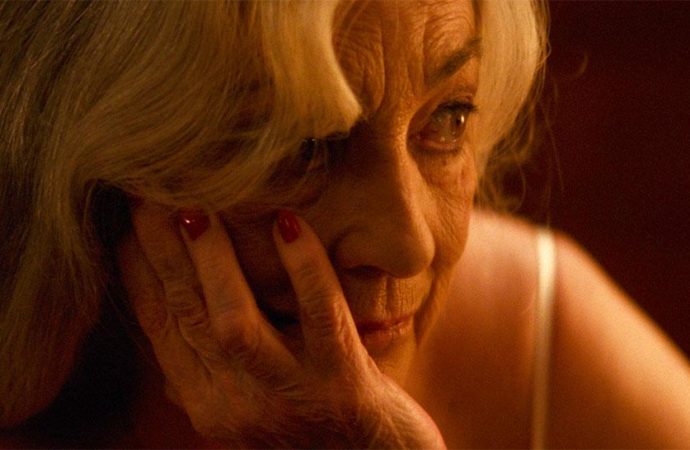
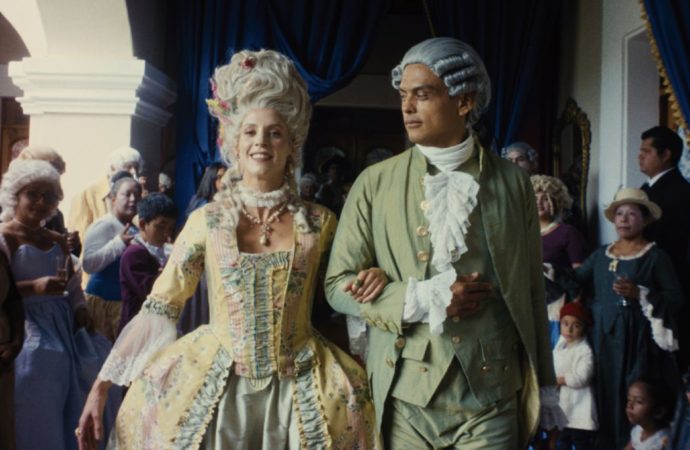



No one has posted any comments yet. Be the first person!